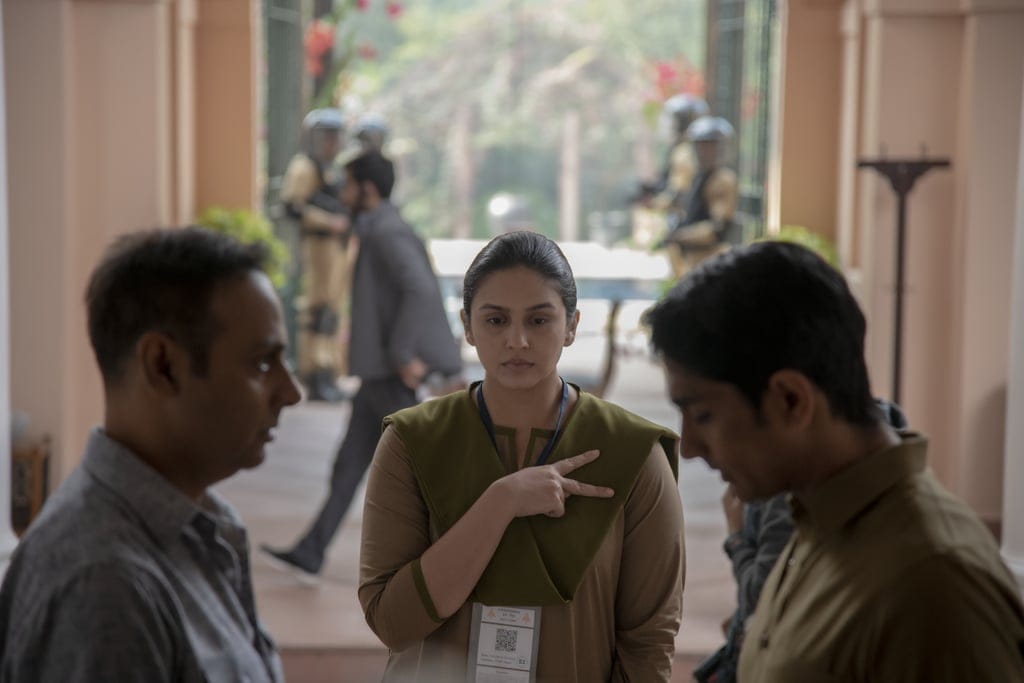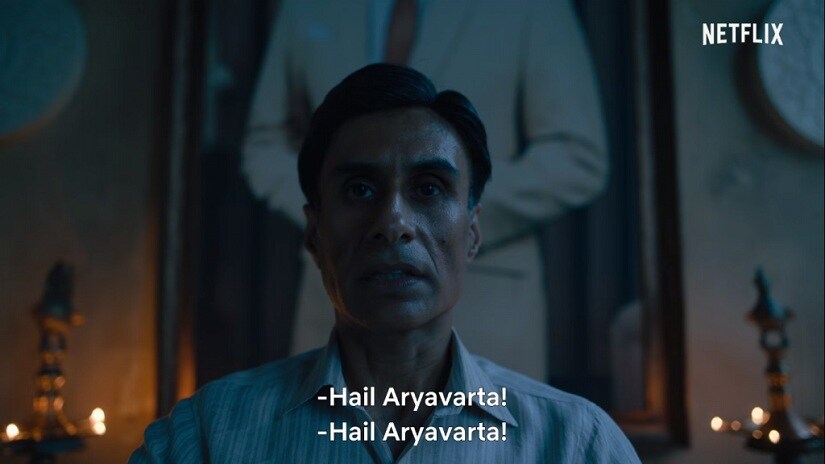About some 15 miles northwest of Noida, an exit from the Noida expressway swerves into a wasteland of decrepit, left-behind structures. A mile or so into this desert, a cascade of seemingly daft and dystopian buildings begins to emerge. This is not a view of the future, but a college that students go to, that may well serve as one. Inside, the winter sun bounces off of the orb of a stunning, imposing dome. They say it’s the library fronted by wide steps leading to the pavement. There is decorative foliage on the sides, as red flags reminiscent perhaps of the soviet era, hang from the orbs and sides of the structure. There is a lot of chaos with men and women haggling over cameras and wires, studying angles and frames. The cold is bitter, the horizon, the air, the deafness of texture, almost nauseating. It is perhaps a little clichéd to call the setting apocalyptic. But we are on the sets of Leila, a Netflix show that promises to be anything but. [caption id=“attachment_6798601” align=“alignnone” width=“825”]  Actor Siddharth in a still from Netflix web series Leila. Youtube screengrab.[/caption] Leila, will be based on novelist Prayaag Akbar’s debut novel of the same name. In the book, a mother goes searching for her missing daughter in a landscape besieged by sectarianism and totalitarian rule, set somewhere in the future. “I was deeply moved by just how emotional the book was. I just knew then that we had to make it. But the visual aspect of it was perhaps the most challenging part. The book isn’t as visual, and so we had to work on creating this view of the future,” Priya Sreedharan, producer, who has sat down to chat for a bit, says. Sreedharan explains that though one can spot green screens, the series will draw as much as it can from organic locations. “We have shot in old Delhi, in Gurgaon and for the climax I felt this was the perfect place, it just has the tone we wanted,” she says. Leila will be helmed by three directors: Deepa Mehta, Shankar Raman and Pawan Kumar. We are on the set where the climax of the series is being shot.
Raman is busy guiding his subjects and assistants. Every once in a while the level of noise rises to a point that someone has to shout for everyone to be quiet. In one corner a table is stacked with carbine firearms next to it a tailor frantically sews uniforms. “It is a big project obviously. Handling shoots and a team so big requires discipline on some level. Most crucially everyone has to believe in the story we are telling, the vision we have for it,” Sreedharan says. [caption id=“attachment_6798611” align=“alignnone” width=“825”]  Huma Qureshi plays the titular character in Leila. Netflix Image.[/caption] Raman quietly walks up to us, probably in need of a breather. “The book occurs over the span of several years. When you convert a book like that into a series format, it may not always work, keeping a certain dramatic narrative in mind. It was challenging to create that central arc for the characters that pretty much every series needs,” Raman says. The series has largely been shot in Delhi-NCR. In terms of location it seems to have hit jackpot as on both sides of the Noida expressway, there are colossal buildings that otherwise pose as sites for education and training. “The book has a lot of soul; it evokes a certain sense of relationships. I think that is what the series is essentially about, relationships and dystopia, which to me is when you are not even connected to your neighbour. When you can’t even approach your neighbour for a cup of sugar,” Raman says. [caption id=“attachment_6798621” align=“alignnone” width=“825”]  Arif Zakaria plays Dr Iyer in Leila. Youtube screengrab.[/caption] Though web-series in India, like Netflix’s own Sacred Games, have already been helmed by more than one director, Leila is possibly the first to have three. How does that even work? “Deepa was the creative producer and the brain behind the series. A major chunk of the vision for the show has been established by her. It was fairly easy for me to take over because a lot of it is in place already. But what multiple directors does is it brings new ideas to the show, perhaps even introduces freshness,” Raman says. The series stars Huma Qureshi, Siddharth and Arif Zakaria in leading roles. Also part of the cast is Sanjay Suri, who joins us with a cup of coffee in his hands and the hint of a developing cold. “Great weather isn’t it,” he says. Suri has already been part of a successful mainstream web-series, Amazon Prime Video’s Inside Edge. “If you told me ten years ago that this would be the future of filmmaking. I probably wouldn’t have believed it. The range of stories, the standard of writing today, is incredible,” Suri says. He smiles when I ask him about completing twenty years in Indian cinema. “It has been a mixture of both. I’m happy with my work. I’m so excited about this project, even though I play a megalomaniac of sorts,” he says, smiling. There are vehicles painted in black being carefully positioned at the foot of the library’s steps. A crew member announces there will be a quick break of 20 minutes as everyone hustles to and fro. It’s almost noon, there is white smoke bellowing from tents that have been erected on a patch of the earth close-by. Lunch is ready, it seems.


)
)
)
)
)
)
)
)
)



